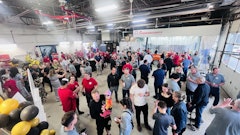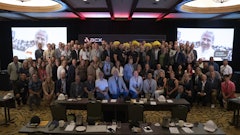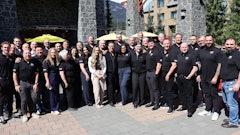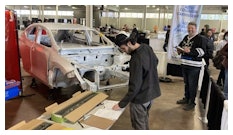
HOW TAKING THE TIME TO DEVELOP YOUR CRAFT WILL HELP YOU SPEED AHEAD OF THE GAME
Column by STEFANO LIESSI

Phrases like “The ten things you need to know,” “This is taking the internet by storm,” “The four top things that will change your life,” etcetera, are all too common.
They reflect on our culture of instant gratification, where we’ve grown accustomed to expecting immediate results with minimal effort. This is not a surprising statement but rather a daily reality, and it’s a problem in the workforce. It astounds me how we constantly strive to get faster at everything. For example, at the drive-thru, we have two lanes now so that you can practice the fine art of the ‘zipper merge’ pre-Big Mac. Self-checkout has been sold to us as a time saver so that we can be in and out faster than ever. The list is endless. If we look at this culture we have created as a society, we will see how the trickle effect is now pooling up and creating havoc within the industry.
Staff often want things to happen yesterday: “the promotion isn’t coming fast enough,” “I don’t get paid enough for someone who has been here eight months…” So, off they go in search of a better job or career. Many speakers and psychologists have all these outstanding cure-all answers that tell you, “You need to do this” and “This is how you manage that.” How’s that working for you? It’s not. Is it?
Although very relatable, I won’t get into financials regarding door rates and pay structures; that’s for a different day. I want to get you thinking about how slowing down can make things work out. This is not just for the shop culture but also the educational and technician cultures. Throwing money at a situation will not always fix things; it just works as a Band-Aid, and eventually, the Band-Aid falls off in the pool. It is said that time heals all wounds; there is merit to this. Cutting back on time is making things worse. We have been taught over the last few years that, “you need to plan for the employee’s career path,” “you need to set them up with benefits and retirement plans from day one,” “employees need downtime, give them ‘X’ number of paid holidays a year right from the start.”
Offer your employees incentives and bonuses, as well as time in lieu. This all sounds wonderful. I wish I had been so lucky way back then. So, here is the thing: there is a crucial component missing from all of this and no, it’s not AI or pizza parties which, by the way, are getting an unfair rap. The crucial component missing is ‘earning it.’ Whatever happened to working your way up the ladder, dealing with the hard knocks, and taking the ‘time’ to get good at your craft? We are so worried about getting to the top fast, and employers are so worried about setting boundaries regarding earning your way up, that a lot of the culture has forgotten about the value of ‘earned placement.’ People think I got my license, diploma, or degree, and they should start at the top. Wrong. All that tells anyone is you can pass a test. Yet, our culture panders to this.
I had a conversation recently with an acquaintance where they described how a recent employee was given a plan for their career as a service tech. It included time for school—paid time, that is—funds for advancements and accommodations during campus time, but they had to start at the bottom and pay their dues, so to speak. What a great opportunity. However, the tech thought he was better than that and quit (after eight months). He has much to learn, and the company seems to have dodged a bullet. They wanted the employee to earn his position. That was too much to ask.
So, how do we solve this problem of instant gratification in the workforce? As I mentioned earlier, there is no magic answer, only ideas. Instead of a culture based on false hope, instability, and open-ended promises, we must build one based on stability, effort, and time-tested earning dedication. This won’t happen overnight, but it’s a shift worth the effort for all involved. The employer hires dedicated staff interested in self-development, working in a facility dedicated to quality. Like-minded people tend to stick together and form a culture based on earning it, not being given it. In my opinion, and you are entitled to my opinion, this is the culture we need to cultivate in our workforce. Slow down and take the required time; if someone doesn’t want to earn their place, show them the door. There is another out there that is deserving of it. Once you have cultivated a team of those willing to earn it, you will have a culture that has earned the pizza party.
























